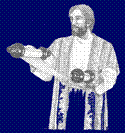|
Mary mania
Australian Catholics are beaming with delight; at last they have their first home-grown saint. On the 19th February, Pope Benedict XVI announced that Mary McKillop, a 19th-century Australian nun who worked tirelessly building schools, orphanages and clinics for impoverished people, is to become Australia's first saint, to be canonized in Rome on Sunday 17th October. As much as I hate to be a party-pooper - I certainly have no desire to offend Catholic friends and acquaintances - I cannot help but express the view that this whole procedure raises serious questions about the legitimacy of the Church that promotes such a gratuitous belief.
The history of the Roman Catholic Church's approach to canonization is sufficient to raise bright red flags. William Saunders, of the Catholic Education Resource Center says this:
The official process for declaring someone a saint is called canonization. Prior to the year 1234, the Church did not have a formal process as such. Usually martyrs and those recognized as holy were declared saints by the Church at the time of their deaths. Before the legalization of Christianity in the year 313 by Emperor Constantine, the tombs of martyrs, like St. Peter, were marked and kept as places for homage.
As time went on, the Church saw the need to tighten the canonization process. Unfortunately, sometimes figures of legends were honored as saints. Or once, the local church in Sweden canonized an imbibing monk who was killed in a drunken brawl - hardly evidence of martyrdom. Therefore, in the year 1234, Pope Gregory IX established procedures to investigate the life of a candidate saint and any attributed miracles. Beginning with Pope Urban VIII in 1634, various Popes have revised and improved the norms and procedures for canonization.
Today the process proceeds as follows: When a person dies who has "fame of sanctity" or "fame of martyrdom," the Bishop of the Diocese usually initiates the investigation. One element is whether any special favor or miracle has been granted through this candidate saint's intercession. The Church will also investigate the candidate's writings to see if they possess "purity of doctrine," essentially, nothing heretical or against the faith. All of this information is gathered, and then a transumptum, a faithful copy, duly authenticated and sealed, is submitted to the Congregation for the Causes of the Saints.
And so on. Among other things, the candidate has to have been motivated by profound charity towards his neighbor and to have interceded for someone in such a way that God saw fit to work a miracle. In sum, they must have lived their lives in "the exercise of heroic virtue". One must add that the Church does not claim that canonization creates saints, only that it is a divinely-granted method for recognizing whom God had already made a saint. One thing should be obvious from the above description even to Bible illiterates: the practice is not based on scriptural instruction. That alone should suffice as a word to the wise. But it gets worse when you compare Catholic doctrine about canonization with Scripture - the two do not see eye to eye.
The Catholic Encyclopedia naturally puts the practice in the best possible light, arguing that the Church views saints as, "nothing more than friends and servants of God whose holy lives have made them worthy of His special love". Daniel was described as "greatly beloved" (Dan. 9:23). Sounds very benign, one must agree. As long as one can accept the notion that God may have "special love" for those who have loved Him with purity of heart, well, so far so good.
But just a moment: since when did Jesus give His disciples authority to proclaim who would be so worthy of God's
|
special love that He would declare them a saint? True, certain individuals were praised for their charity (see, for example, Philippians 2:19-22), but no chaser was ever added to the effect that such folk would enjoy God's greater affection in heaven. The silence on such a matter by Jesus' own apostles strongly supports the case that it would be presumptuous to do so. Indeed, in the scriptural passage that comes closest to having any bearing on positions in the kingdom of God Jesus tells us that such privilege "is not mine to grant, but it is for those for whom it has been prepared by my Father" (Matt. 20:23). Not the slightest hint is given that God would reveal to His followers the criteria upon which He would base His decisions.
Once recognized officially by the church as a saint, such an individual may be "worshiped". A strict distinction1 is made in Catholic dogma between douleia worship of saints, defined as honor and reverence, on the one hand, and latreia worship of God, defined as "adoration strictly so-called", on the other. Catholic dogma believes that if one can honor an angel, why not glorified saints, brothers to angels? We are told that, "There is Scriptural warrant for such worship in the passages where we are bidden to venerate angels"2, and the following passages are then cited: Exodus 23:20 ff.; Joshua 5:13 ff.; Daniel 8:15 ff.; 10:4 ff.; Luke 2:9 ff.; Acts 12:7 ff.; Revelation 5:11 ff.; 7:1 ff.; Matthew 18:10. Please check each one for yourself and marvel at the misuse of the Word of God. Far more relevant is the following passage:
Now I, John, saw and heard these things. And when I heard and saw, I fell down to worship before the feet of the angel who showed me these things. Then he said to me, "See that you do not do that. For I am your fellow servant, and of your brethren the prophets, and of those who keep the words of this book. Worship God" (Rev. 22:8-9).
We can be sure that John was not intending to "worship" the angel in the same way he worshiped God, but merely sought to show him "honor" and "respect" - the very things the Catholic Church says we may do towards saints. John was told that even that was unacceptable. The proposed distinction in worthiness of worship between God and saints just cannot stand up under close scrutiny.
The Catholic faithful on earth are permitted to "invoke" their canonized brethren in heaven. That is, they are to beseech the heavenly saints to intercede with God on their behalf. After noting that Paul sought prayers from the brethren on his behalf the Catholic Encyclopedia says, "If we may beseech those who still live on earth, why not those who live in heaven?". Even if one were to consider such a statement reasonable, at this very point we come to the most serious objection to the whole idea. Contra Catholic dogma, the "dead in Christ" (1 Thess. 4:16) are just that - dead. Were they in any other state Paul would undoubtedly have chosen a different word to describe believers who had preceded him in death! They must await the return of Jesus Christ to rise from the dead, after which they will be joined in the clouds by living believers (vs. 17). They are in no fit state to intercede for the living.
Further - and I have seen no attempt by the Church to ameliorate this inherent regrettable feature of the dogma - the doctrine necessarily implies two distinct classes of "believing dead" in heaven. First, the "saints" and, second, the. well. what can you call them? Not-quite-saints, quasi-saints? - glorified believers who have "made it" to heaven but are not quite worthy of worship and invocation. Not good.
Much more could be said, but enough is enough. Isn't it time the Catholic Church recognized the unbiblical nature of the dogma and abandoned it completely? Or does it put the traditions of the fathers ahead of Scripture? Surely not.
|





